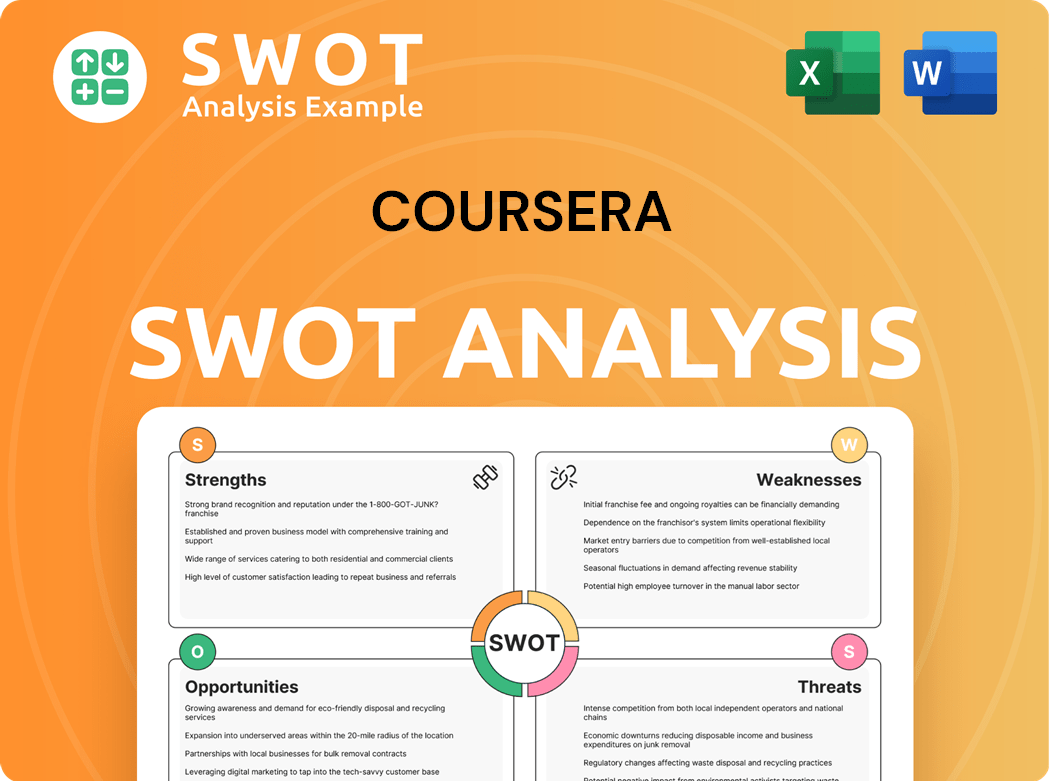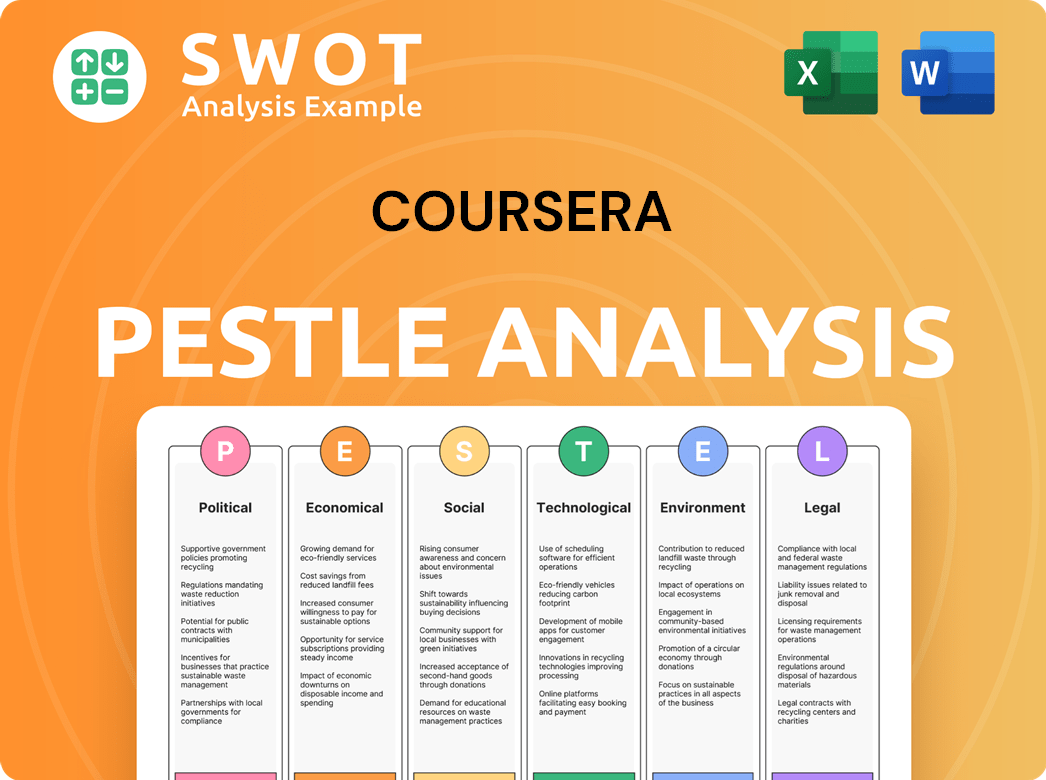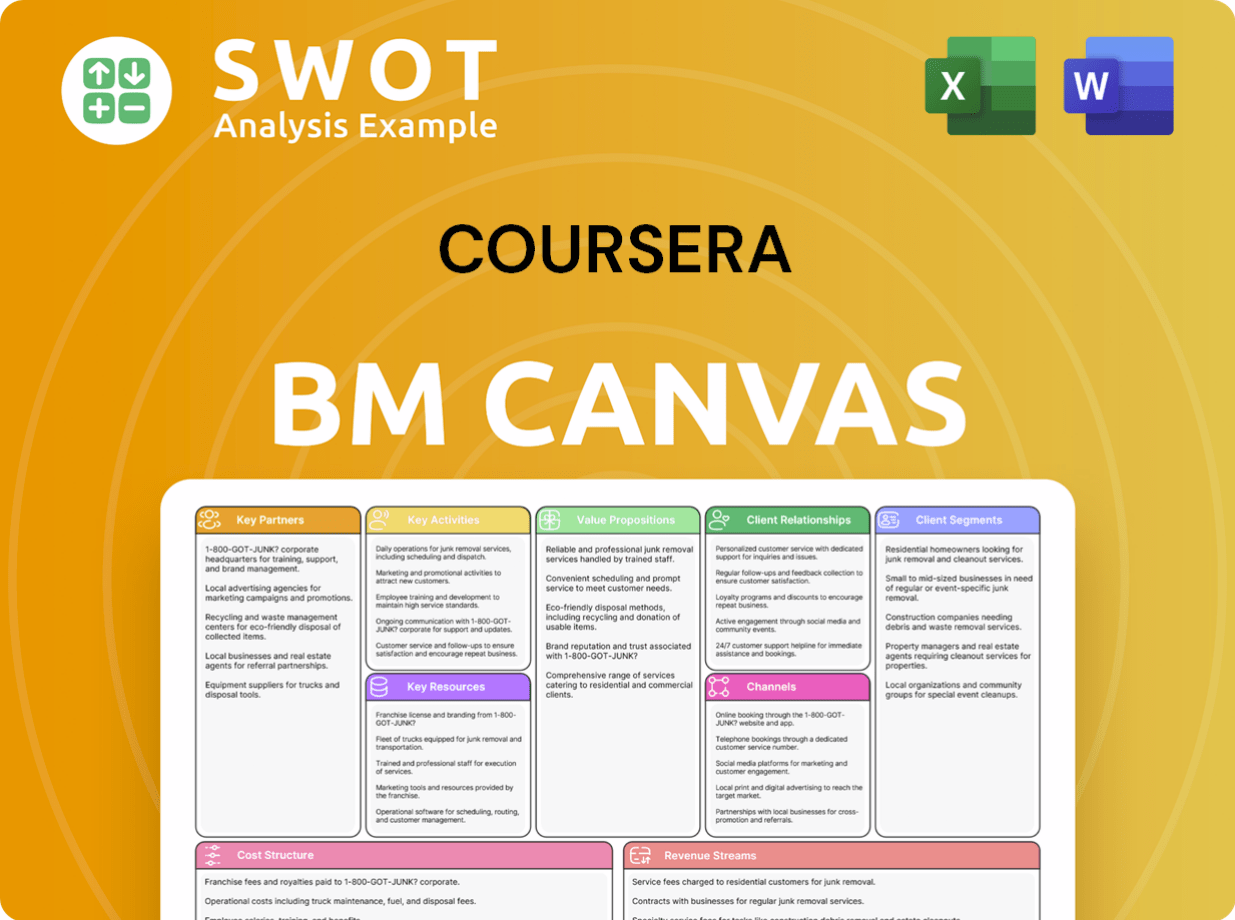Coursera Bundle
Who Really Owns Coursera?
Understanding the ownership structure of a company is crucial for grasping its strategic direction and future prospects. With the recent appointment of Greg Hart as the new President and CEO of Coursera, effective February 3, 2025, succeeding Jeff Maggioncalda, it's a perfect time to examine the company's ownership dynamics. This leadership change underscores the importance of knowing who controls the reins of this major online learning platform.

Coursera, a leading online learning platform founded in 2012 by Andrew Ng and Daphne Koller, has grown significantly since its inception. From its humble beginnings, the company's Coursera SWOT Analysis reveals the complex interplay of its business model and its investors. This exploration will provide insights into the Coursera company's ownership, including its evolution, key investors, and the impact of public shareholders on its strategic decisions. We'll look at its history, business model and current CEO.
Who Founded Coursera?
The story of Coursera, a leading online learning platform, began in 2012. It was founded by Andrew Ng and Daphne Koller, both computer science professors from Stanford University. Their initial vision was to provide universal access to education, a mission that shaped the company's trajectory from the start.
Ng and Koller started offering their Stanford courses online in the fall of 2011, which paved the way for the official launch of Coursera. While the exact equity distribution between the founders at the beginning isn't publicly available, their focus was clear: to democratize education. This commitment to accessibility has been a core part of Coursera's identity.
Early funding played a crucial role in determining the Coursera ownership structure. The company secured an initial $16 million in a funding round. Key investors in this round included prominent venture capital firms such as Kleiner Perkins Caufield & Byers and New Enterprise Associates (NEA). These early investments were pivotal in fueling Coursera's growth and expansion.
Andrew Ng and Daphne Koller, Stanford professors, founded Coursera in 2012.
Initial funding of $16 million was secured, with Kleiner Perkins and NEA as key investors.
GSV led a Series B investment of $63 million in 2013.
NEA led Series C and D rounds in 2015 and 2017, totaling over $60 million and $64 million, respectively.
Venture capital firms held a significant portion of Coursera's ownership due to these early investments.
These early investments provided the necessary capital for Coursera's initial growth and development.
The early funding rounds significantly influenced the Coursera investors landscape. In 2013, GSV led a Series B investment of $63 million. NEA continued its support, leading a Series C round of over $60 million in 2015 and a Series D round of $64 million in 2017. These investments highlight the crucial role venture capital played in Coursera's early years, providing the financial backing for its expansion and ability to compete in the online education market. For a deeper dive into how Coursera has grown, consider exploring the Marketing Strategy of Coursera.
Coursera SWOT Analysis
- Complete SWOT Breakdown
- Fully Customizable
- Editable in Excel & Word
- Professional Formatting
- Investor-Ready Format

How Has Coursera’s Ownership Changed Over Time?
The ownership structure of the Coursera company underwent a significant transformation with its initial public offering (IPO) on March 31, 2021. Listed on the New York Stock Exchange under the ticker 'COUR', the IPO priced shares at $33 each, valuing the company at roughly $4.30 billion. This strategic move aimed to raise approximately $519 million, marking a pivotal moment in the company's financial journey. On its debut trading day, shares closed at $45, pushing the market capitalization to $5.9 billion, reflecting strong investor confidence.
The evolution of Coursera's ownership structure is a key aspect of understanding its trajectory. Since its IPO, the company's ownership has been shaped by institutional investors, retail investors, and insider holdings. Understanding who owns Coursera provides insights into the company's strategic direction and financial health. Examining the Coursera history reveals how different funding rounds and strategic decisions have influenced its ownership landscape.
| Event | Date | Impact on Ownership |
|---|---|---|
| Initial Public Offering (IPO) | March 31, 2021 | Transitioned from private to public ownership; raised approximately $519 million. |
| First Day of Trading | March 31, 2021 | Market capitalization reached $5.9 billion, reflecting investor confidence. |
| Ongoing | Post-IPO | Institutional investors gained significant influence; ownership structure evolved with share trading. |
As of December 31, 2024, institutional investors hold a substantial portion of Coursera's shares, approximately 62%, indicating their considerable influence on the company's direction. Key players in the Coursera investors landscape include BlackRock, Inc., owning 14.19 million shares (8.80%), NEA Management Company, LLC with 12.87 million shares (7.98%), and Vanguard Group Inc., holding 12.15 million shares (7.54%). Other significant investors include Morgan Stanley (9.75 million shares, 6.05%) and Baillie Gifford & Co (8.88 million shares, 5.51%). This ownership structure is a mix of institutional (70%), retail (16%), and insider holdings (18.15% as of fiscal year 2024). For a broader view of the competitive environment, consider exploring the Competitors Landscape of Coursera.
Coursera's ownership structure has evolved significantly since its IPO, with institutional investors playing a dominant role.
- The IPO in March 2021 marked a major shift from private to public ownership.
- Institutional investors currently hold a significant majority of shares, influencing strategic decisions.
- Understanding the Coursera ownership structure is crucial for assessing the company's future direction.
- Key institutional investors include BlackRock, NEA Management Company, and Vanguard Group.
Coursera PESTLE Analysis
- Covers All 6 PESTLE Categories
- No Research Needed – Save Hours of Work
- Built by Experts, Trusted by Consultants
- Instant Download, Ready to Use
- 100% Editable, Fully Customizable

Who Sits on Coursera’s Board?
The current board of directors significantly influences the strategic direction and decision-making processes of Coursera. Andrew Ng, a co-founder of Coursera, holds the position of Chairman of the Board. The board's composition includes a mix of founders, major shareholders, and independent members, all of whom play a crucial role in overseeing the company's governance. Understanding the dynamics of the board is essential for anyone looking into Coursera ownership.
Detailed information about individual board members, their shareholdings, and voting power can be found in the company's proxy statements, which are filed annually. These filings provide comprehensive insights into the board's composition and voting matters. As a public benefit corporation based in Delaware, Coursera's governance also reflects its commitment to providing universal access to learning. For more details on the company's mission, consider reading about the Growth Strategy of Coursera.
| Board Member | Title | Key Role |
|---|---|---|
| Andrew Ng | Chairman of the Board, Co-founder | Oversees strategic direction and decision-making |
| (Information available in proxy statements) | (Information available in proxy statements) | (Information available in proxy statements) |
| (Information available in proxy statements) | (Information available in proxy statements) | (Information available in proxy statements) |
The board of directors is pivotal in shaping Coursera's strategic direction. The board includes founders, major shareholders, and independent members. Proxy statements provide detailed insights into board composition and voting power.
- Andrew Ng is the Chairman of the Board.
- The board oversees strategic decisions.
- Governance reflects the mission of providing universal access to learning.
- Public filings offer comprehensive details on governance.
Coursera Business Model Canvas
- Complete 9-Block Business Model Canvas
- Effortlessly Communicate Your Business Strategy
- Investor-Ready BMC Format
- 100% Editable and Customizable
- Clear and Structured Layout

What Recent Changes Have Shaped Coursera’s Ownership Landscape?
In the past few years, the ownership landscape of the Coursera company has seen some notable shifts. The company's strategic direction has been influenced by these changes. A significant move was the completion of a $95 million share repurchase authorization by May 7, 2024, designed to counteract dilution. Despite these efforts, the company has experienced a year-over-year dilution rate of approximately 4-5% in recent quarters. The market capitalization has decreased from its IPO high of $4.30 billion on March 31, 2021, to $1.34 billion as of June 13, 2025, representing a decrease of 68.84%.
Leadership transitions have also played a role in shaping the company's direction. Jeff Maggioncalda, after seven years, retired as President and CEO, and as a Board Member, effective February 3, 2025. Greg Hart was appointed as the new President and CEO, and a Member of the Board, effective the same date. Moreover, the company saw changes in key roles during 2023-2024, including the Chief Revenue Officer and Chief Operating Officer positions. These changes reflect an evolving strategy for the Coursera company.
| Metric | Value | Year |
|---|---|---|
| Total Annual Revenue | $695 million | 2024 |
| Revenue Growth | 9% | 2024 vs. 2023 |
| Free Cash Flow | $59 million | 2024 |
| Market Capitalization (as of June 13, 2025) | $1.34 billion | 2025 |
Industry trends indicate a growing emphasis on institutional ownership, and Coursera is no exception. The company's financial performance in 2024 included a total annual revenue of $695 million, marking a 9% increase from the previous year. Significantly, the company achieved its first full year of positive Adjusted EBITDA and generated $59 million in Free Cash Flow in 2024. Coursera is heavily investing in generative AI, launching over 450 generative AI courses in 2024, and seeing significant enrollment in these programs. For more detailed information on the company, you can read this article about Coursera ownership.
Coursera was founded in 2012 by Andrew Ng and Daphne Koller, both computer science professors at Stanford University. They created the platform to offer massive open online courses (MOOCs) from top universities globally. This initiative aimed to make education accessible to a broader audience.
Yes, Coursera is a public company. It went public on March 31, 2021, and is listed on the New York Stock Exchange (NYSE) under the ticker symbol COUR. This move allowed Coursera to raise capital and expand its operations.
As of February 3, 2025, Greg Hart is the current President and CEO of Coursera. He took over from Jeff Maggioncalda, who retired. Hart's appointment signals a new phase for the company.
In 2024, Coursera reported a total annual revenue of $695 million, a 9% increase from the previous year. The company achieved its first full year of positive Adjusted EBITDA and generated $59 million in Free Cash Flow in 2024.
Coursera Porter's Five Forces Analysis
- Covers All 5 Competitive Forces in Detail
- Structured for Consultants, Students, and Founders
- 100% Editable in Microsoft Word & Excel
- Instant Digital Download – Use Immediately
- Compatible with Mac & PC – Fully Unlocked

Related Blogs
- What are Mission Vision & Core Values of Coursera Company?
- What is Competitive Landscape of Coursera Company?
- What is Growth Strategy and Future Prospects of Coursera Company?
- How Does Coursera Company Work?
- What is Sales and Marketing Strategy of Coursera Company?
- What is Brief History of Coursera Company?
- What is Customer Demographics and Target Market of Coursera Company?
Disclaimer
All information, articles, and product details provided on this website are for general informational and educational purposes only. We do not claim any ownership over, nor do we intend to infringe upon, any trademarks, copyrights, logos, brand names, or other intellectual property mentioned or depicted on this site. Such intellectual property remains the property of its respective owners, and any references here are made solely for identification or informational purposes, without implying any affiliation, endorsement, or partnership.
We make no representations or warranties, express or implied, regarding the accuracy, completeness, or suitability of any content or products presented. Nothing on this website should be construed as legal, tax, investment, financial, medical, or other professional advice. In addition, no part of this site—including articles or product references—constitutes a solicitation, recommendation, endorsement, advertisement, or offer to buy or sell any securities, franchises, or other financial instruments, particularly in jurisdictions where such activity would be unlawful.
All content is of a general nature and may not address the specific circumstances of any individual or entity. It is not a substitute for professional advice or services. Any actions you take based on the information provided here are strictly at your own risk. You accept full responsibility for any decisions or outcomes arising from your use of this website and agree to release us from any liability in connection with your use of, or reliance upon, the content or products found herein.